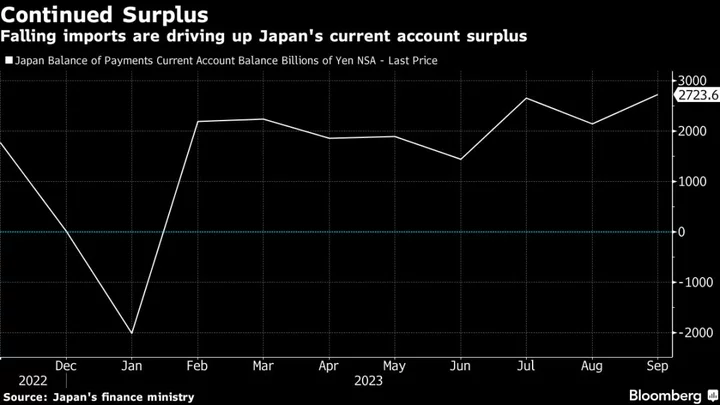Japan’s current-account surplus hit a record high in the first half of this fiscal year, marking a potentially positive development for the country’s economic recovery and weakened currency.
Japan’s current-account surplus reached a record of ¥12.7 trillion ($84.2 billion) for the six months through September, driven by a drop in imports, according to the Finance Ministry on Thursday. The surplus also rose from a year earlier to ¥2.72 trillion in September, the highest level in 18 months, although it fell short of economists’ consensus forecast of ¥2.98 trillion. The country extended its surplus streak to eight months.
Thursday’s data holds some good signs for the economy as it shows the cost of energy imports is decreasing while exports of cars are recovering on the back of eased supply chain constraints. The return of tourists is also clear. While most analysts expect Japan’s real economy to return to contraction in the third quarter, the current account data suggests there are underlying elements still supporting the economy.
Japan is scheduled to release its preliminary gross domestic product figure for the July to September period next Wednesday.
The current account results are “probably due to inbound spending, and the impact of the weaker yen,” said Shungo Akimoto, market economist at Mizuho Securities. “Each tourist is spending more, while the number of visitors is clearly jumping, reducing the service balance.”
While the service balance remained in the red in the six months through September, the surplus in the tourism sector increased 15-fold, as foreign visitors returned in droves. The number of tourists visiting Japan recovered to more than 96% of pre-pandemic levels in September, as the weak yen helped drive arrivals, according to Japan’s National Tourism Organization.
Meanwhile the overall current account surplus was mostly led by an improved trade balance, with import bills sliding 13.2% from the previous year, driven by declines in crude oil, liquefied natural gas and coal. Higher exports, fueled by car and construction machinery shipments, also contributed to the trade surplus.
Those results could also help support the country’s weakening currency down the line, as overseas earnings gained through the trade of goods and services could be converted into yen for domestic use by Japanese firms later on.









